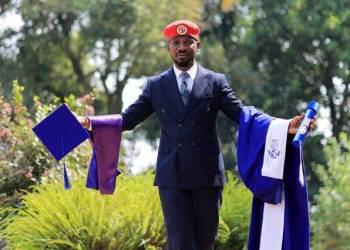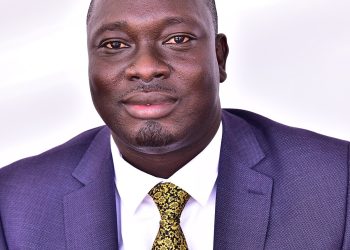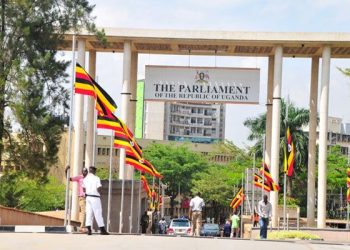The 2021 election will likely be fought and won on a money basis due to Uganda’s commercialized politics. Do you or the Opposition have the financial clout to out-spend or win against President Museveni?
Well, I think that question goes to us as a team and as a nation on how we are prepared. I have said it time and again that it is not about me. We are prepared because we are sensitizing the nation and we continue to do so. We have identified like-minded leaders to carry this through. This is going to be a different election because it is a revolutionary one.
But I don’t believe those with money are the ones who will win. President Museveni has been giving the ghetto youth money to woo them onto his side, but afterward, they thank us. We shall win because he (Mr. Museveni) will [indirectly] fund our campaigns should he dish out cash.
Four-time presidential candidate, Dr. Kizza Besigye, knows as much about how Ugandan campaigns run. He has counseled you that an election alone cannot take power from President Museveni. You argue that if victory is overwhelming, the vote cannot be stolen. Do you have this overwhelming support?
We all agree that the nation is united against dictatorship. I am a firm believer in democracy and people’s power over gun power. I know with an overwhelming vote, we can take overpower.
We shall replicate the precedent we set during the Bugiri Municipality election, Arua Municipality, Rukungiri, and Kyadondo East by-elections. We must win by knock-out.
There is criticism that Uganda’s government is too big; too many ministers and MPs. If you were to run and win the next presidential election, how would you re-organize the government to ensure more frugal spending of public resources while maximizing service delivery?
One of our core principles as People Power (movement) is having a lean and effective government. President Museveni is widening the government and its administrative costs because his ambitions have since changed; his government is no longer bent on service delivery, but patronage.
When you cut the number MPs and ministers (there are currently 458 legislators and 81 ministers – Editor), there are savings [to be] made which can go into service delivery.
We have abnormally many ministers and I believe in a smaller Parliament who are monitored by the people who have put them into those places. We shall move the civil service from working for the president to serving the people.
Uganda currently has too many security and intelligence outfits, resulting in rivalry and wasteful duplication [of responsibilities]. What are your plans to reform the sector to the 21st-century security challenges?
In the past, we had fewer security apparatus and a vigilant population unlike now when we have all these security agencies and yet there is so much criminality.
The more people own their country, the more secure the state is; so, you will not need all these other branches of law enforcers. Under President Museveni, police and army are ceremonial security agencies and this has brought a lot of squabbles within the agencies.
I will empower police to enforce law and order, revive its Criminal Investigations Department and the Special Branch for the serious investigations, pay them well and make sure they deliver. The UPDF will handle the national security and guarding of the boundaries.
You are a political novice and civilian. How will you handle security forces?
[Former two-time President] Milton Obote was a civilian like myself, didn’t the army salute him? He ruled twice. That means it is possible. We have been approached by some army officers and the police, telling us that they are not happy with the [Museveni] regime. They all work on orders and that is why you have been hearing them fronting the saying [that they are acting on] ‘orders from above’.
President Museveni has said he will go nowhere and asked those who want him to leave power where he would go. Would you be willing to grant him immunity so that he doesn’t fear prosecution for the wrongs his government could have committed?
We are short of ex-presidents who advise current presidents. We want to set a new precedent as a generation where we shall have a former president giving wise counsel to a current one.
We will give President Museveni amnesty and always consult him on issues of governance. That is why we are preferring peaceful means to have a transition of power.
You were widely criticized and your knowledge of the national economy questioned when you failed to articulate fiscal policy during an interview with NTV. Do you feel prepared to be Uganda’s President?
In many cases, I will be wrong on articulation. I do it sometimes deliberately and at times involuntarily. I have always and I will repeat, I didn’t present myself as any kind of [an academic] professor or the most experienced politician in the world.
I am just one of the millions of Ugandans who have been served unfairly and oppressed.
I don’t work alone, Uganda is endowed with many talented people who can be put to use and help this country to produce the best ever government.
Uganda’s debt currently stands at Shs42 trillion. Much of this money has been spent on infrastructure development. If you were to stand and win an election, how would you tackle this problem of debt?
As a country, we do not have the financial muscle and sometimes resort to debts. We will make sure that every money we borrow goes to a sector that is productive enough such as agriculture so that at the end of the day, we are able to service it (debt).
We shall re-channel some of the money to developing more tourism centers and agriculture to widen the country’s revenue base and close the debt gap.
The government currently gives elderly persons about Shs25,000 monthly stipend. This social welfare is largely donor-financed. What is your plan for senior citizens?
These people deserve a dignified living in the evening [of their lives] because we know they have served this country and are now resting. This money can be stepped up to at least Shs100,000 which still is not enough.
President Museveni’s government has multiple times tried to modernize agriculture, but with the less-than-satisfactory outcome. What are you going to do differently for this key sector?
President Museveni is using the wrong people to empower farmers. We plan to revive cooperatives and have farmers sensitized on climate and soils they have so that they grow the right crops to maximize productivity.
As the government, we shall have a special plan for bumper harvests where we buy from farmers, store the crops and sell them at minimum price to the population in times of scarcity. This is a plan to ensure constant food security in the country.
You are facing seven charges. If you are convicted on one of them and sentenced to two years in prison, you will be ineligible to stand for President. What are your options?
Stop making it look like it is something about me. When I am convicted, I am convinced that there are many Kyagulanyis in this country that will come up to fight for the same cause. So the country is more united than the government is for the next change.
Countries such as Rwanda, Germany, and Israel have immortalized their troubling history by establishing museums. Would you, for instance, support a proposal for Uganda to build an Idi Amin museum?
When such a museum is put in place, it will help the leaders to trace our origin and check their way of service. It will even help remind some who keep forgetting. This is something we need urgently.
One of Uganda’s intractable problems is land conflicts. What reforms would stop the menace?
Our land acquisition and valuation law is so outdated. We need to revisit it to bring more provisions.
Compensation should be determined in such a way that people are happy with what they get out of their property.
































































